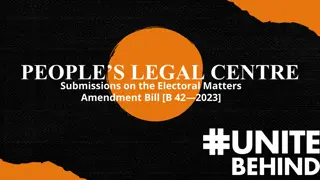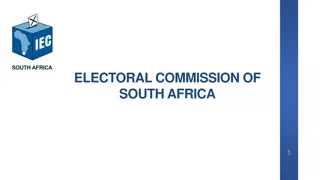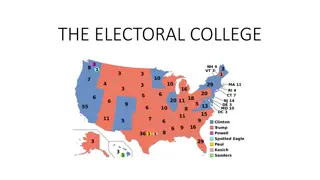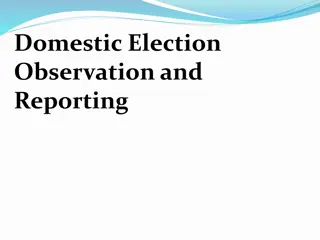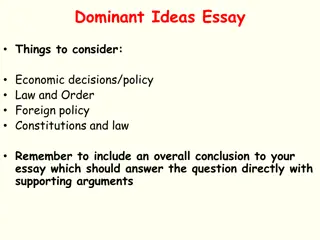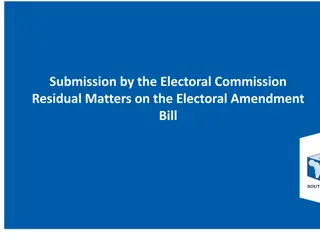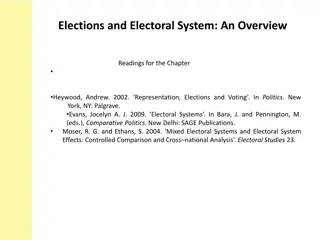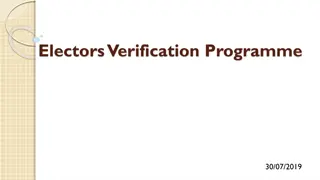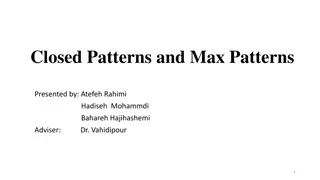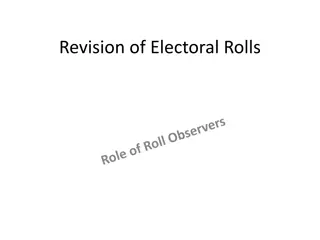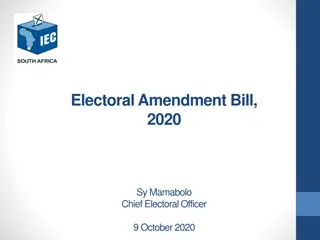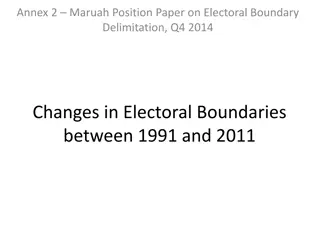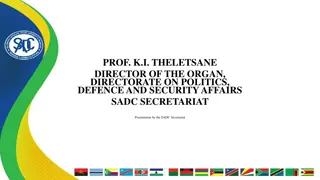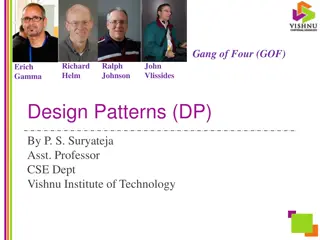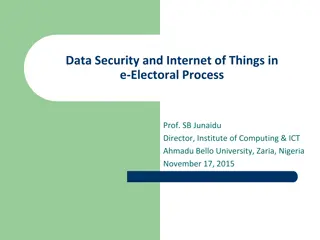Patterns of Electoral Malpractices in Democratizing Regimes
This research project examines electoral malpractices in democratizing regimes, focusing on the competitiveness and fairness of elections. The study aims to identify patterns of malpractice and irregularities in selected European countries and their impact on political regimes and EU membership. The hypothesis suggests that limited election competitiveness by incumbents can lead to changes in regime types over time.
Download Presentation

Please find below an Image/Link to download the presentation.
The content on the website is provided AS IS for your information and personal use only. It may not be sold, licensed, or shared on other websites without obtaining consent from the author. Download presentation by click this link. If you encounter any issues during the download, it is possible that the publisher has removed the file from their server.
E N D
Presentation Transcript
Beyond vote rigging: common patterns in electoral malpractices in de- democratizing regimes Toru , 5 December 2017 Prof. Adam Szyma ski, University of Warsaw Wojciech Ufel, MA, University of Wroc aw
Paper initial phase of the project Project Between Fair and Rigged. Elections as a Key Determinant of the Borderline Political Regime - Turkey in Comparative Perspective Faculty of Political Science and International Studies, University of Warsaw, 2017-2018, financed by the Polish National Science Centre
Main research goal Contribution to the development of the research on the de-democratization thanks to carrying out the analysis of the state of elections in selected countries in Europe and its neighborhood as the crucial democratic institution. It can help to identify better not only the phenomenon of de-democratization but also the types of regimes existing nowadays in this region.
Research focus Competitiveness of elections crucial for regime type; electoral malpractice Recent elections in selected countries a) Main case - Turkey 2014 presidential elections, 2015 parliamentary elections b) Comparative cases: Belarus (control case) 2015 presidential elections, 2016 parliamentary elections Hungary 2014 parliamentary elections Macedonia 2014 parliamentary and presidential elections, 2016 (June/December) parliamentary elections Serbia 2016 parliamentary elections, 2017 presidential elections
Main research question Are elections in the selected countries free, fair and competitive? Can some types of electoral malpractice and irregularities be identified? How does the state of elections in terms of their fairness and competiveness influence the political regime? What does it tell us about the EU impact on political systems of states being EU members or associated members?
Research hypothesis In the countries in Europe and its close neighborhood elections competitiveness limited by incumbents can in the long run become a factor deciding not only about a change within the political regime (e.g. loss of democratic quality) and but also a change of the regime (to less democratic one).
Electoral malpractice The violation of electoral integrity, i.e. violation of internationally accepted standards of elections throughout the whole electoral cycle - in the pre- electoral period, during the campaign, on the voting day as well as after the elections Malpractice vs. mispractice
Typology of electoral malpractices (Birch 2011) Manipulation of the law Manipulation of the vote choice Mainipulation of the voting act
Electoral malpractices in Turkey Electoral Integrity Project ranking: August 2014 presidential elections 86th place (127 countries) 2015 parliamentary elections 101st place (135 countries) OSCE reports although legal improvements, still defective or ambigous regulations > malpractices
General findings electoral malpractices in Turkey 1. Many legal deficits and mispractice 2. Malpractices also present: a) mainly manipulation of the law (first of all gerrymandering) and vote choice (media bias, misuse of state resources, undue impact) usually use of incumbency advantage by the AKP short- and long- term measures (clientelistic networks) b) voting act fraud, etc. not necessary particular atmosphere (polarisation, populism, use of fears and ideology)
Other cases General overview (EIP 2017) PEI rank country PEIIndexi laws proceduresi boundaries media finance voting Turkey 47,39484151 115 44,763 63,368 55,3812 41,592 38,884 57,409 Hungary 56,18782043 75 44,188 69,394 44,466 45,428 47,667 69,772 Macedonia 47,72746468 113 52,147 56,440 52,572 40,157 39,210 53,526 Serbia 48,47156779 111 50,063 59,902 60,565 34,314 34,444 52,604 Belarus 39,47262319 136 38,900 43,926 67,611 34,222 39,778 56,111
Other cases Electoral laws (EIP 2017) country Electoral malpractices Comments Hungary Amendments to voting system, high tolerance for malapportionment, allegations of gerrymandering, limitations to out-of-country voting Changes Code, as well as the major change Constitution. Malpractices corrected facilitation international actors (esp. EU) to Electoral of the Macedonia Mistrust in a voter-list, limitations to out-of-country voters, malapportionment, attempt at launching noncompetitive elections. has been through a of Serbia Nonclear and overly burdensome procedures for candidate registration, insufficient rules for financial auditing, inaccurate voters lists. Belarus Permissive system of voter s registration, limitations to candidate registration and campaigning, unequal access to resources.
Other cases Media bias (EIP 2017) country Malpractices Comments Hungary Biased media coverage, ownership of private media by people connected to FIDESZ, lack of political balance in Media Council Macedonia Biased (public and private) media coverage due to state dominance in advertising censorship), failure of media to distinguish coverage of candidates and public officials Low media coverage of campaigning expensive advertising, state activities of officials dominate coverage, incumbent favoured by all private and public tv outlets and most papers Lack of media coverage did not allow voters to make an informed choice, state media were biased and favoured incumbent, obstruction of work of journalists market (self- Serbia Belarus Despite coverage media, their influence is very limited. some in fair private
Other cases Campaign finances/state resources (EIP 2017) country Malpractices Comments Hungary State-financed campaign was cheaply sold to FIDESZ during elections, campaign activities blurring division of state and party, some NGOs actively campaigning for incumbent (without and oversight) Broad involvement of civil servants in the proces (corruption and intimidation), significant advantage of incumbent over other candidates Additionally, clientelists networks were used to finance FIDESZ broad Macedonia Serbia Significant advantage of incumbent over other candidates, insufficient control over private donations. Belarus Lack of transparency, illegal suport of many NGOs for the incumbent, business and civil servants intimidation, misuse of state resources for the sake of campaigning. Many candidates did not campaign, which led to questioning their genuineness
Conclusions 1. Despite the differences in details, in all analyzed states the incumbents have resorted to a plethora of means inhibiting their competitiveness, distorting the level playing field by: 1. Discreetly manipulating the electoral law, administration and procedures (salami tactics) 2. Deliberatly limiting the access of opposition parties to resources, especially media or financial and administrative assets
Conclusions 2. Two campaigning strategies has been implemented in compared cases: 1. Extreme rivalry high intensity campaigning, extensive advertising, blackmailing and accusations against rivals, anti-systemic rhetorics of total war (Turkey, Hungary) 2. Non-campaigning low intensity campaigning, lack of debates and advertising, low public interest in voting (Serbia, Macedonia June 2016, Belarus)
Conclusions 3. Although all these countries made in the past a relative progress in the democratization process (certainly to different degree in each case), which was influenced also by the EU within the mechanism of conditionality, the current phenomenon concerning the elections and their integrity reveals that the EU is in one more crisis as a normative power and stabilizer of new political regimes. - However, the case of Macedonia shows, that a combined effort of political opposition, citizens and external institutions, can positively influence the fairness of elections.
Conclusions 4. The electoral malpractices contribute substantially to shifting the party system to the dominant party model - (coalitions in some cases change a little, Belarus exception as far as party system is concerned) together with the marginalization of opposition. When we add to this the populist policy and use of clientelistic networks of different type, we see the challenge for the unconsolidated democracies or countries in a transition to the democratic regime.
Conclusions 5. Negative contribution of malpractices (de- democratization complex phenomenon): a) Short-term&direct they are themselves manifestations of problems in the democratization process b) Long-term&indirect change of the political regime for a less democratic one also possible (not only within the regime) - as a result of the increasingly unlimited and uncontrolled power of incumbents whose policy is strengthening the authoritarian tendencies observed in a particular country.
Thank you for your attention! Website of the project: http://www.inp.uw.edu.pl/ projekt_wybory_turcja/en
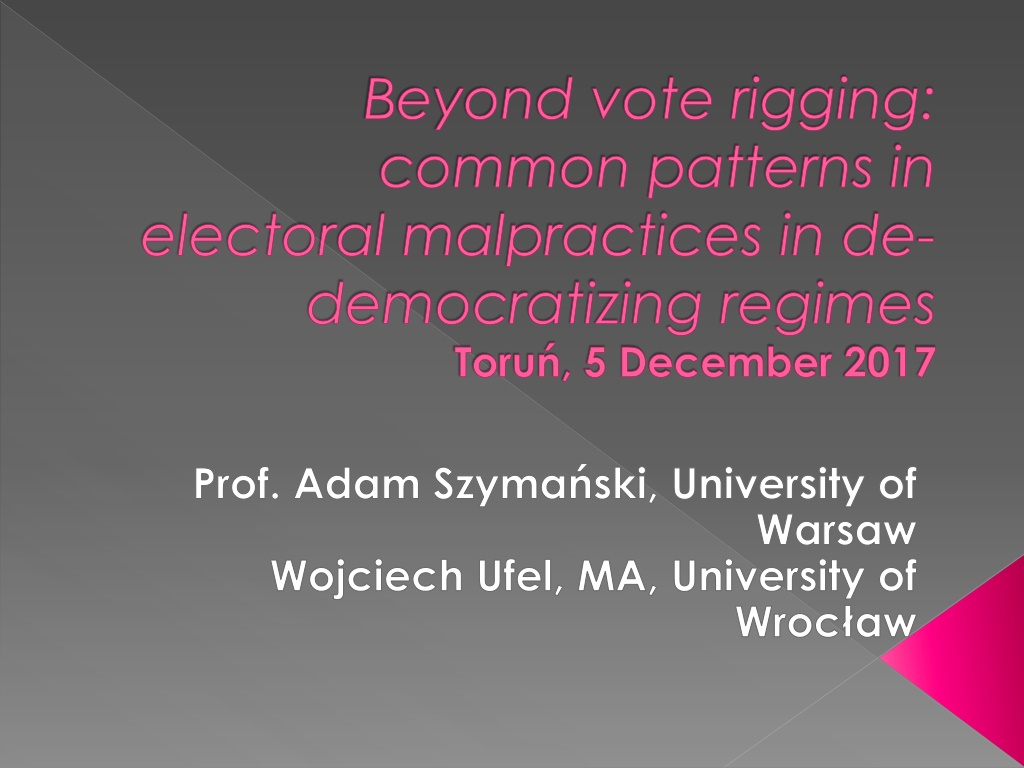

![RE: ELECTORAL MATTERS AMENDMENT BILL [ B42-2023]](/thumb/18837/re-electoral-matters-amendment-bill-b42-2023.jpg)

